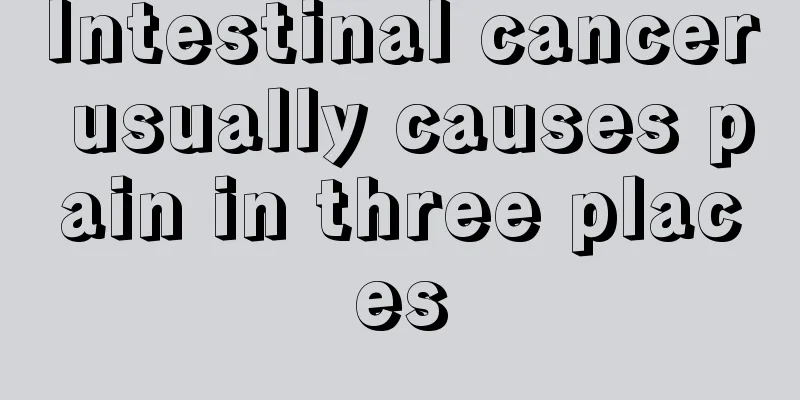Is abdominal bloating and farting a sign of colon cancer?

|
Flatulence and farting are not necessarily indicative of colorectal cancer, but some colorectal cancer patients may experience this condition. Flatulence and farting are mainly related to gastrointestinal function. 1. Gastrointestinal motility problems: When gastrointestinal motility is too slow, food stays in the intestines for too long, and it is easy to ferment with bacteria in the intestines to produce gas, leading to bloating. In this case, you can try taking probiotics, or massaging your abdomen clockwise to help promote gastrointestinal motility and relieve discomfort. 2. Incomplete intestinal obstruction: This condition can also cause abdominal distension and flatulence. Flatulence and flatulence may be closely related to diet and gastrointestinal function, but are generally not related to colorectal cancer. If you find yourself often experiencing abdominal distension, difficulty defecating, or changes in stool characteristics, it is recommended that you undergo an electronic colonoscopy as soon as possible to rule out the possibility of colon cancer. 3. Symptoms of colorectal cancer patients: Common problems in the early stages of colorectal cancer are changes in bowel habits and stool characteristics, not just bloating and farting. For example, the frequency of bowel movements increases, or the stool is thinner and finer. If these symptoms occur frequently or worsen, it is recommended to have a colonoscopy to confirm whether there are abnormalities and lesions in the intestine, so as to take appropriate treatment measures. 4. Eating habits: Bad eating habits may also cause bloating and farting. For example, eating too fast, drinking carbonated drinks, eating a lot of beans and high-fiber foods. These foods easily produce gas in the intestines, leading to bloating and farting. Adjusting eating habits, eating more easily digestible foods, and reducing the intake of carbonated drinks can effectively relieve these symptoms. 5. Stress and emotions: Stress and emotions can also affect gastrointestinal function, leading to bloating and farting. Long-term stress and anxiety may lead to gastrointestinal dysfunction and increase gas production. Appropriate relaxation and decompression, such as yoga, meditation or moderate exercise, can help improve gastrointestinal function and reduce the occurrence of bloating and farting. 6. Lack of exercise: Lack of exercise can also affect gastrointestinal motility, leading to bloating and farting. Proper exercise can promote gastrointestinal motility, help digestion and exhaust. Exercising moderately every day, such as walking, jogging or doing some light gymnastics, can help relieve bloating and farting. Stomach bloating and farting are not necessarily signs of colon cancer, but if these symptoms persist or are accompanied by other abnormal symptoms, it is recommended to see a doctor as soon as possible to rule out potential health problems. By adjusting diet, increasing exercise, and reducing stress, you can effectively improve gastrointestinal function and reduce the trouble of bloating and farting. |
<<: Time and items for follow-up after surgery for cholangiocarcinoma
>>: What to do if you have severe pain from liver cancer bone metastasis
Recommend
What to do if your heels hurt after standing for a long time? Daily care is very important
We all usually have this phenomenon that the heel...
What should beginners of yoga pay attention to
Yoga is a sport suitable for people of all ages, ...
What to do when your hands feel numb from work
If your hands become numb due to fatigue from wor...
What are the taboo times for visiting a woman who has just given birth?
It is a long and painful process for women to get...
What should I do if I have bloating on the right side of my abdomen?
Some people feel bloating and a little pain in th...
Beware of the "three livers", they are close relatives of liver cancer!
The liver is the "headquarters" of the ...
What foods can cause liver cancer when eaten in excess? Things to note when preventing liver cancer
Eating too much ginger may increase liver cancer ...
People who can tolerate cold and heat have good physique
In our lives, there are many people with very goo...
Water heater installation height
Water heaters are a commonly used household appli...
Soak ginger in white vinegar to remove freckles
Now is an era where appearance is everything. Eve...
How to drink tea to get rid of bad breath? Which tea should you drink?
Bad breath has a huge impact on people's imag...
What are some tips for curing tearful eyes?
In real life, tears are a common condition. Usual...
How to deal with an ugly hairline
From an aesthetic point of view, a bad hairline w...
Is long-term nasal congestion a sign of nasopharyngeal cancer?
Is long-term nasal congestion a sign of nasophary...
Height-increasing stretching exercises
After exercising, we should try to do some stretc...









